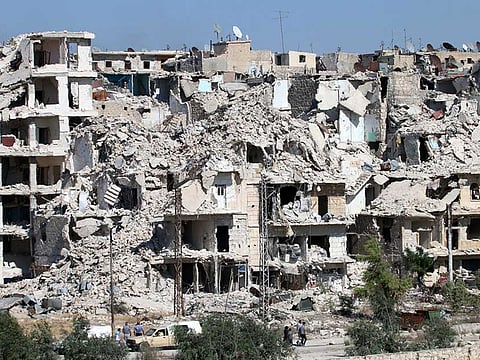Aleppo is burning and the world is watching
The Syrian city has seen many sieges throughout history, but the current one is the hardest and most viciously inhumane

An urgently arranged phone call, one would widely imagine, between United States Secretary of State John Kerry and Russian Foreign Minister Sergei Lavrov, preceded Russia’s Defence Minister Sergei Shoigu’s announcement that corridors are to be set up to help civilians and unarmed opposition forces to leave the besieged Syrian city of Allepo.
Presumably, Kerry has ‘begged’ Lavrov to do something “that would save all of us”. One could assume the following conversation between the two:
Kerry: Hey Buddy. You can’t just, you and [Bashar] Al Assad’s forces, freely continue bombing the city. This must stop.
Lavrov: We are bombing Daesh (the self-proclaimed Islamic State of Iraq and the Levant) as you already know ...
Kerry: Stop this nonsense, you know, we know and the whole world knows that hundreds of innocents are dying because of the bombing.
Lavrov: Ok, what do you have in mind?
Kerry: Don’t know... be creative. It is so shameful that people are not only killed by bombing, but also by starvation and lack of medical aid inside the city under siege. The world is watching us and the Syrian people will never forgive us. Whatever you do should help save us all.
Lavrov: Let me see what we can do.
In fact, the only action the Americans have taken so far is mainly talking to the Russians who have been actively involved in bombing targets in Syria since March 2015. Despite all the hype about the so-called coordination between Moscow and Washington, what we saw in the last few days was merely an announcement by Russia’s defence minister that “three routes would be opened [for civilians] and a fourth for armed rebels” to escape from the city of Aleppo. Almost simultaneously and in tandem with the cynical Russian move, Syrian President Bashar Al Assad offered an amnesty for opposition forces, “if they surrender within three months”.
Al Assad’s forces have mercilessly been besieging the city for almost four years, cutting off rebel-held areas and severing all routes of supply. It is common knowledge that the Syrian regime’s offensive has been heavily aided by Russian air power since the spring of 2015.
Sadly, in view of the shameful total American and European inaction in Syria, particularly in Aleppo over the last four years, the world has been witnessing the heart-breaking destruction of one of the greatest ancient cities in the region. A relative, one of the lucky few who lives in the government-held western part of the city, was telling me the other day that “Aleppo as we knew it, is no more”. The last time he was able to “foolishly cross” over to the eastern part of the city was in early 2014 and he was there for less than 30 minutes. The place “was totally unrecognisable”, he said, because of the scale of destruction and he was hastily advised to leave.
Aleppo (Halab in Arabic), the most populous city in the country (with a population of about 2.5 million, according to a 2004 census), is historically known to be Syria’s commercial and industrial capital. It was the largest city in the Ottoman Empire after Constantinople and Cairo and strategically located as a vibrant trading centre, halfway between the Mediterranean Sea and Iraq for centuries. It is famous for its Old City and covered Souq Al Madina (town’s market) and became a Unesco World Heritage Site in 1986. Unfortunately, most of the Old City and the Souq of Aleppo itself, has been savagely obliterated as a result of a running battle between government forces and the rebels since 2012. These sites are well-ingrained in the memories of many generations of Syrian youths as ‘must visit’ historic places as part of their high school curriculums.
Aleppo has seen many sieges throughout history, but the current one is the hardest and most viciously inhumane.
Now, with Turkish President Recep Tayyip Erdogan considering pulling out of Syria, as his priorities have muddled up at home following the recent failed coup attempt, his country has been weakened to continue his campaign against Al Assad. His Prime Minister and close confidant Binali Yildirim, has already indicated that Turkey could review its relation with Syria in the near future. Additionally, Erdogan will soon meet Russian President Vladimir Putin, whom the Turkish president had described only two months ago as “the occupier of Syria”. Their talks are expected to include highly strategic issues that should help Turkey overcome its acute economic constraints.
The situation in Aleppo is rapidly becoming untenable. The only remaining link the city has with Turkey along the border, The Castello Road, is likely to fall into the hands of Al Assad’s forces soon. The tide has unfortunately turned against the Syrian opposition forces with steady help for the regime from Russian air force, Hezbollah and the Iranian militia. Hezbollah leader, Hassan Nasrallah, has recently described the battle for Aleppo as “decisive”. In his speech last month, he declared that the “real, strategic and greatest battle [in Syria] is in Aleppo and the surrounding areas”.
To add to the misery of about 400,000 unfortunate people trapped in eastern Aleppo, many will die from the continuing barrel-bombing by Syrian government forces and Russia’s endless air strikes. Now, with Erdogan turning his face the other way, the Syrian opposition fears that the Turkish president may strike a deal with Putin when they meet on August 9. With the almost total absence of any significant input by the US and European Union, entangled as they are with their own acute problems at home, and the expected receding of Erdogan, destroying Aleppo’s hospitals, schools, markets and its population will sadly continue unabated.
Mustapha Karkouti is a former president of the Foreign Press Association, London.


